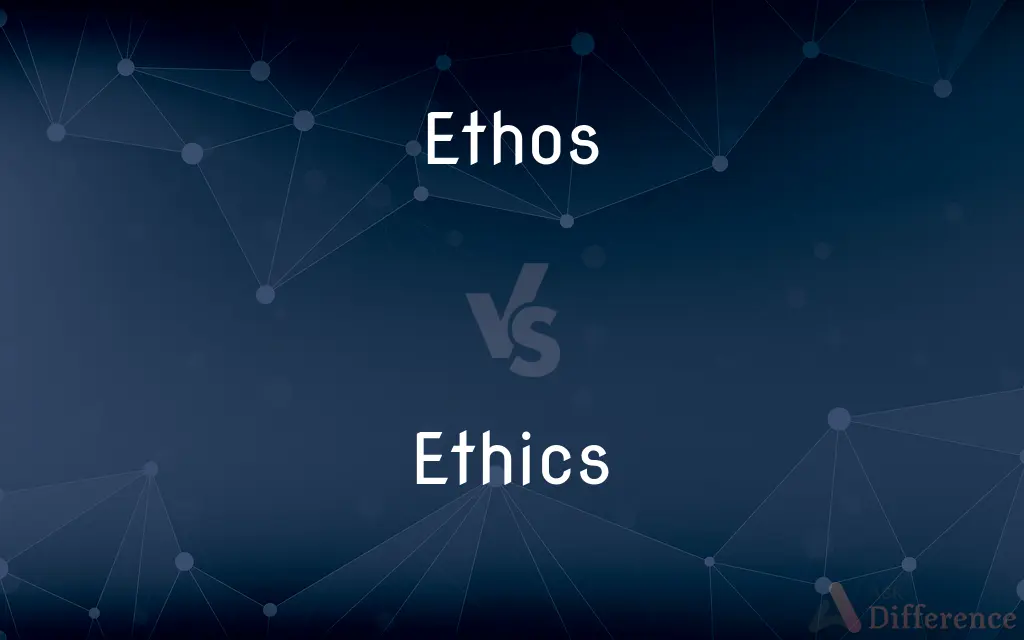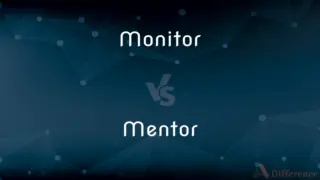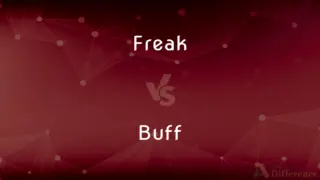Ethos vs. Ethics — What's the Difference?
By Tayyaba Rehman — Updated on November 6, 2023
Ethos refers to the guiding beliefs or ideals of a community, while ethics are moral principles governing individual or group behavior.

Difference Between Ethos and Ethics
Table of Contents
ADVERTISEMENT
Key Differences
Ethos and ethics, often intertwined in discussions of morality and culture, serve distinct roles in their application to human behavior and society. Ethos embodies the characteristic spirit, prevalent beliefs, and guiding values of a culture, community, or organization. It is the overarching set of informal norms that shape the identity and behavior of a group. Ethics, on the other hand, consists of the moral principles that govern individual or group behavior, serving as a formal framework for determining what is right or wrong.
While ethos operates on a broader societal level, influencing collective identity, ethics is more personal and prescriptive, focusing on individual decision-making and morality. One could say ethos is the moral climate or ‘personality’ of a community, influenced by history, tradition, and common practice. Conversely, ethics is the study and application of moral principles, often codified in professional conduct or legal stipulations, which individuals and groups use to navigate complex moral dilemmas.
Ethos is intrinsic and often unspoken, an essence distilled from the traditions and collective conscience of a group, whereas ethics is explicit, a system of moral principles that individuals consciously follow. The ethos of a society can influence its members’ ethics, as the prevailing attitudes and beliefs can shape one’s perception of what is morally right or wrong. Meanwhile, ethics can be seen in professional codes, such as medical or business ethics, which prescribe specific behaviors within those fields.
Understanding ethos involves looking at the character and customs of a group, a more anthropological approach, while ethics requires a philosophical or theological analysis of moral thought and behavior. The ethos of a nation, for example, might be characterized by a strong work ethic and individualism, but the ethics of its citizens will reflect how they resolve moral questions in their daily lives, often in a manner informed by that ethos.
In different contexts, ethos and ethics inform each other; the ethos of a group could shape its ethical viewpoint, and the ethical beliefs of individuals can collectively give rise to a particular ethos. For instance, a company’s ethos may prioritize innovation and risk-taking, shaping the ethical decisions of its employees to favor bold actions over conservative approaches, while the individual ethics of its team members might also influence the company’s ethos over time.
ADVERTISEMENT
Comparison Chart
Definition
The spirit and values of a community or group.
Moral principles that govern behavior.
Focus
Collective beliefs and identity.
Individual moral judgments and rules.
Application
Cultural or organizational.
Personal or professional conduct.
Nature
Informal and often unspoken.
Formal and codified.
Origin
Anthropological, derived from traditions.
Philosophical or theological analysis.
Compare with Definitions
Ethos
Prevailing character of a culture.
The ethos of the samurai is centered on honor and discipline.
Ethics
Moral principles governing conduct.
Doctors are bound by strict medical ethics.
Ethos
The guiding beliefs of a group.
Her work reflected the company's ethos of innovation.
Ethics
Philosophical study of morality.
He specialized in ethics during his philosophy degree.
Ethos
Set of guiding principles.
The school's ethos emphasized academic excellence and integrity.
Ethics
System of moral values.
Her actions were guided by a strong sense of ethics.
Ethos
The spirit of a community.
The city's ethos was rooted in diversity and acceptance.
Ethics
Professional code of conduct.
The lawyer adhered to the ethics of her profession.
Ethos
Collective personality.
The ethos of the movement was grounded in nonviolent protest.
Ethics
Moral philosophy.
The ethics class challenged students to consider difficult moral dilemmas.
Ethos
Ethos ( or US: ) is a Greek word meaning "character" that is used to describe the guiding beliefs or ideals that characterize a community, nation, or ideology. The Greeks also used this word to refer to the power of music to influence emotions, behaviors, and even morals.
Ethics
Ethics or moral philosophy is a branch of philosophy that "involves systematizing, defending, and recommending concepts of right and wrong behavior". The field of ethics, along with aesthetics, concerns matters of value; these fields comprise the branch of philosophy called axiology.Ethics seeks to resolve questions of human morality by defining concepts such as good and evil, right and wrong, virtue and vice, justice and crime.
Ethos
The characteristic spirit of a culture, era, or community as manifested in its attitudes and aspirations
A challenge to the ethos of the 1960s
Ethics
Moral principles that govern a person's behaviour or the conducting of an activity
A code of ethics
Medical ethics also enter into the question
Ethos
The disposition, character, or fundamental values peculiar to a specific person, people, culture, or movement
"They cultivated a subversive alternative ethos" (Anthony Burgess).
Ethics
The branch of knowledge that deals with moral principles
Neither metaphysics nor ethics is the home of religion
Ethos
The character or fundamental values of a person, people, culture, or movement.
Ethics
A set of principles of right conduct.
Ethos
(rhetoric) A form of rhetoric in which the writer or speaker invokes their authority, competence or expertise in an attempt to persuade others that their view is correct.
Ethics
A theory or a system of moral values
"An ethic of service is at war with a craving for gain" (Gregg Easterbrook).
Ethos
(aesthetics) The traits in a work of art which express the ideal or typic character, as influenced by the ethos (character or fundamental values) of a people, rather than realistic or emotional situations or individual character in a narrow sense; opposed to pathos.
Ethics
Ethics (used with a sing. verb) The study of the general nature of morals and of the specific moral choices to be made by a person; moral philosophy.
Ethos
The character, sentiment, or disposition of a community or people, considered as a natural endowment; the spirit which actuates manners and customs; also, the characteristic tone or genius of an institution or social organization.
Ethics
Ethics (used with a sing. or pl. verb) The rules or standards governing the conduct of a person or the members of a profession
Medical ethics.
Ethos
The traits in a work of art which express the ideal or typic character - character as influenced by the ethos (sense 1) of a people - rather than realistic or emotional situations or individual character in a narrow sense; - opposed to pathos.
Ethics
(philosophy) The study of principles relating to right and wrong conduct.
Ethos
(anthropology) the distinctive spirit of a culture or an era;
The Greek ethos
Ethics
Morality.
Ethics
The standards that govern the conduct of a person, especially a member of a profession.
Ethics
The science of human duty; the body of rules of duty drawn from this science; a particular system of principles and rules concerting duty, whether true or false; rules of practice in respect to a single class of human actions; as, political or social ethics; medical ethics.
The completeness and consistency of its morality is the peculiar praise of the ethics which the Bible has taught.
Ethics
Motivation based on ideas of right and wrong
Ethics
The philosophical study of moral values and rules
Common Curiosities
Is ethos specific to a particular field or area?
Ethos can be specific to cultures, organizations, or even professions.
Can ethics change over time?
Yes, ethical standards can evolve with societal norms and personal development.
Is ethos static or dynamic?
Ethos is dynamic and can evolve with societal changes.
Are ethics always derived from a society's ethos?
Not always; ethics can also come from personal, religious, or philosophical beliefs.
Is ethos related to ethics in business?
Yes, a business's ethos can inform its ethical practices and corporate responsibility.
Can ethos be negative?
Yes, if a group's values are harmful or regressive.
Can ethics be objective?
Some argue that certain ethical principles are objective; others believe they are subjective.
How do you identify a group's ethos?
By examining their cultural narratives, values, and behaviors.
How is ethics taught?
Ethics is taught through philosophy, religious teachings, and professional training.
Can ethos influence an individual's ethics?
Yes, the prevailing ethos of a community can shape an individual's ethical views.
Can an individual have an ethos?
Typically, ethos refers to groups, but an individual can embody the ethos of their community.
Are ethics universal or relative?
Some ethical principles are considered universal, while others may be relative to culture or situation.
Are ethics always legal?
Not necessarily; ethics and law do not always align.
Does ethos reflect a society's history?
Yes, ethos often includes historical values and practices.
How do we see ethos in everyday life?
Ethos is evident in societal norms, traditions, and collective attitudes.
Share Your Discovery

Previous Comparison
Monitor vs. Mentor
Next Comparison
Freak vs. BuffAuthor Spotlight
Written by
Tayyaba RehmanTayyaba Rehman is a distinguished writer, currently serving as a primary contributor to askdifference.com. As a researcher in semantics and etymology, Tayyaba's passion for the complexity of languages and their distinctions has found a perfect home on the platform. Tayyaba delves into the intricacies of language, distinguishing between commonly confused words and phrases, thereby providing clarity for readers worldwide.















































